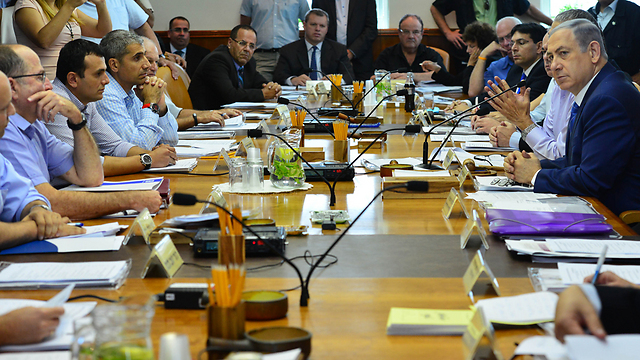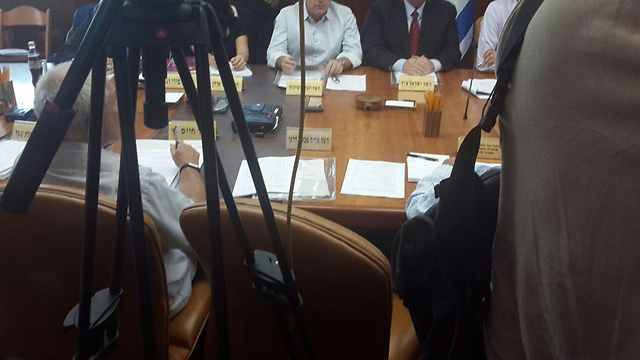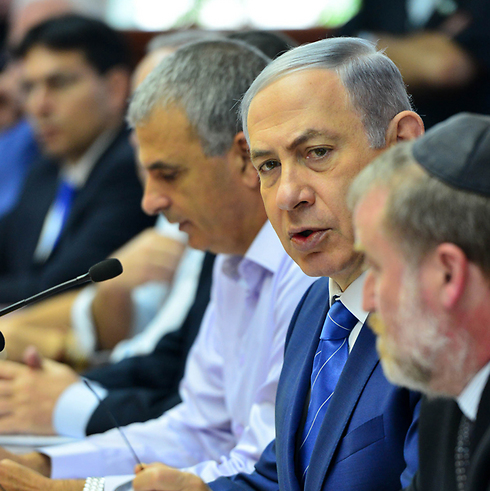Meeting adjourned after Shas ministers boycott vote, Bayit Yehudi leader Bennett threatens to vote against budget over cuts to education; Netanyahu: The conversation is about how to split the pie, rather than how to grow it.
The government meeting convened Wednesday morning to discuss the national budget was ended in the early evening following disagreements between the Finance Ministry and other ministries, and following threats voiced by some ministers that they would refuse to approve the budget in the Knesset – where the government coalition has a whisper-thin majority.
Prime Minister Benjamin Netanyahu announced that the meeting would be reconvened after further understandings were achieved.
Despite the many disagreements, one issue was settled: the Finance Ministry agreed to limit the cut to the higher education budget to NIS 123 million instead of NIS 263 million.
Meanwhile, Finance Minister Moshe Kahlon has begun a round of talks with government ministers in the hopes of defusing any remaining problems and bring the budget to a vote.
Shas ministers Aryeh Deri and David Azulai boycotted the government vote on Wednesday morning in protest of the proposed 2015-2016 state budget.
On Tuesday, Netanyahu warned ministers that his government would collapse if they did not put a stop to their demands and rally behind his 2015-16 budget.
Ministers already secured an extra NIS 8 billion shekels ($2.1 billion) for the budget plan, which covers more than NIS 414 billion. But they are still asking for more spending on defense, police, and education, while also pressing for value added taxes on basic goods to be scrapped.

“The State of Israel will have a budget because otherwise it will not have a government and our economic and security situation would deteriorate,” Netanyahu said in terse remarks ahead of a meeting of key ministers.
“Demands always exceed what there is, but in the end the right decisions are made. We will do so this time as well.”
Economy Minister and chairman of Shas Aryeh Deri and Religious Services Minister David Azulai threatened to vote against the proposed budget because of a dispute with the Finance Ministry over VAT exemptions for the lower classes.
Sources close to Deri said that “the minister will not compromise. He demands 0% VAT for the poor on electricity and water and 0% VAT for the entire population on public transportation.”
The sources said that talks between the Shas chairman’s representatives and the Finance Ministry reached a dead end.

Another possible hurdle to passing the budget is Education Minister Naftali Bennett’s objection to a NIS 1 billion cut from his ministry’s budget, claiming that “this is critically hurting preschool education in the periphery and math studies.”
Bayit Yehudi ministers have threatened to vote against the budget as well if this dispute is not resolved.
Finance Ministry officials said the cutback in question comes in two parts: 40 percent from the coalition funds promised to Bennett when his party joined the government (NIS 600 million), and NIS 780 million from the education budget (from an addition to the budget he was promised). Political officials said reducing the cuts in coalition funds could help pacify Bennett.
At the beginning of the government meeting, Prime Minister Benjamin Netanyahu called on the ministers to approve the budget. “The budget is balanced and responsible and meant to promote economic growth. As a result, every family will save hundreds of shekels every month, and that is significant,” he said.
The prime minister lamented that the conversation is about how to split the pie, rather than how to grow it.
“We have to continue the (economic) growth, and that is why the level of taxing will not increase. When the money gets to the citizens, they will make better use of it than the bureaucrats would,” he said. “There are reforms (in the budget) that reduce the cost of living for the citizens of Israel. It’s important to reduce the prices of food, transportation and health, and increase the supply of housing.”

“The Budget Department has been working for months to reach agreements,” said Finance Minister Moshe Kahlon. “There is a significant expansion in civilian spending – in education, health, public security. The budget expansions are good and necessary. We’re dealing with investments and with the periphery. These are significant growth generators.”
Meanwhile, Culture and Sport Minister Miri Regev said she would fight for an increase in the culture budget. “We still have a long day and night. I hope we can reach an agreement during the day,” she said.
Should the budget get cabinet approval it will go to the Knesset for a vote on August 31. The government is hoping for final parliamentary approval for the 13-month plan by November 19.
In addition to the budget, an accompanying bill would implement a series of reforms in housing, food and banks aimed at lowering the high cost of living, a long-standing frustration for Israeli voters over the past five or six years.
As reported by Ynetnews
